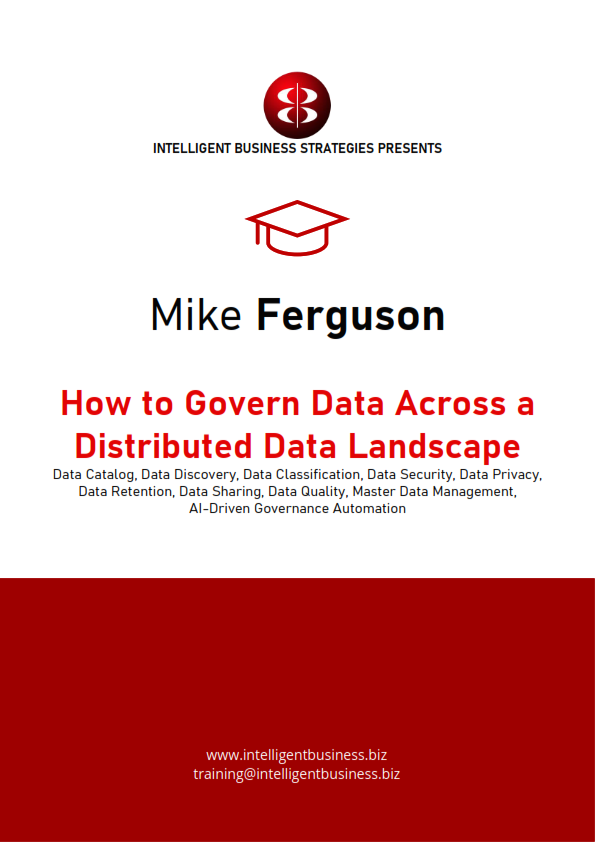
Featured Content

Data Warehouse Automation & Real-time Data – Reducing Time to Value in a Distributed Analytical Environment

Smart Infrastructure & Smart Applications for the Smart Business – Infrastructure & Application Performance Monitoring

Data Catalogs – Governing & Provisioning Data in a Data Driven Enterprise (16 October 2024, Stockholm)

Data Strategy: Building The Foundation of a Data-Driven Enterprise (13-14 November 2024, Italy Livestream Training)
Education
How to Govern Data Across a Distributed Data Landscape

– Data Catalog, Data Discovery, Data Classification, Data Security, Data Privacy, Data Retention, Data Sharing, Data Quality, Master Data Management, AI-Driven Governance Automation
Request information on running this seminar as an onsite (can be given as Live Streaming training)
Click here for a full brochure
OVERVIEW
Many businesses today are operating in a distributed computing environment with data and processes running across on-premises systems, multiple clouds, on SaaS applications and the edge. It this environment, with so much going on, data is much harder to find and govern. Also, the number of data sources continues to grow and master data, the most widely used data in any business, is becoming harder to find, manage and keep synchronised across so many systems in a hybrid computing environment. This two-day in-depth class looks at this problem and shows how to successfully implement a data governance program to govern data across a distributed data landscape. This includes governing data access security, data privacy, data sharing, data retention and data quality with data quality encompassing master data management to create a 360-degree view of customers, products, suppliers, and other core entities. It is intended for chief data officers, heads of data governance, enterprise architects, data architects, MDM professionals, business professionals, database administrators, data engineers, and compliance managers responsible for data governance.
The class takes a detailed look at the business problems caused by poorly governed data and how it can seriously impact business operations, cause unplanned operational costs, and destroy confidence in accuracy of business intelligence, machine learning model predictions and recommendations. It also defines the requirements that need to be met for a company to confidently define, manage, and govern data as well as create and share consistent reference and master data across operational applications and analytical systems both on-premises and in one or more clouds.
Having understood the requirements, you will learn what should be in a governance programme. This includes a data governance framework that includes data governance roles and responsibilities, processes, policies, technologies, and a core set of data governance capabilities to govern data across a distributed data landscape. It also includes a master data management strategy and what you need to do to bring your master data under control. We will look at how to make use of a business glossary, a data catalog with automated data discovery, data quality profiling, sensitive data classification, enterprise-wide and domain-oriented data governance policy definition by data owners around the business and policy enforcement across a distributed data landscape. We look at data cleaning and data integration, to provision master data and reference data products and how Customer Master Data can be combined with data warehouse and big data to create a Customer Data Platform (CDP) for a customer intelligent omni-channel front-office.
During the seminar we take an in-depth look at the technologies and best practice methodologies and processes for governing data across on-premises systems, SaaS applications, multiple clouds, and the edge.
AUDIENCE
This seminar is intended for business and IT professionals responsible for enterprise data governance including data access security, data privacy, data sharing, data usage, data retention, data quality (includes master data management) of both structured data and content. It assumes a basic understanding of data governance, data management, metadata, data warehousing, data cleansing, data integration, etc.
LEARNING OBJECTIVES
Attendees will learn how to set up an enterprise data governance program to systematically govern data and content across their distributed data landscape from a single place. Using a data governance framework and key technologies like data catalogs, data classifiers, data fabric and MDM they will learn what is needed to discover, classify and govern data and content. This includes data access security, data privacy, data loss prevention, data sharing, data retention, and data quality.
MODULES
- Module 1: What is data governance and why do we need it?
- Module 2: What are the requirements and what’s needed to govern data across distributed data landscape?
- Module 3: The importance of a business glossary
- Module 4: Understanding your data landscape – auto data discovery, cataloguing and mapping to a business glossary
- Module 5: Classifying data and content to know how to govern it
- Module 6: Governing data security across your distributed data landscape
- Module 7: Governing data privacy across your distributed data landscape
- Module 8: Governing data retention across your distributed data landscape
- Module 9: Governing data sharing across your distributed data landscape
- Module 10: Governing data quality across your distributed data landscape
- Module 11: Governing data quality using master data management
- Module 12: Transitioning to a common approach to centralised master data maintenance – the change management process
- Module 13: Combining MDM with big data and your data warehouse to create a customer data platform
Click here for a full brochure





